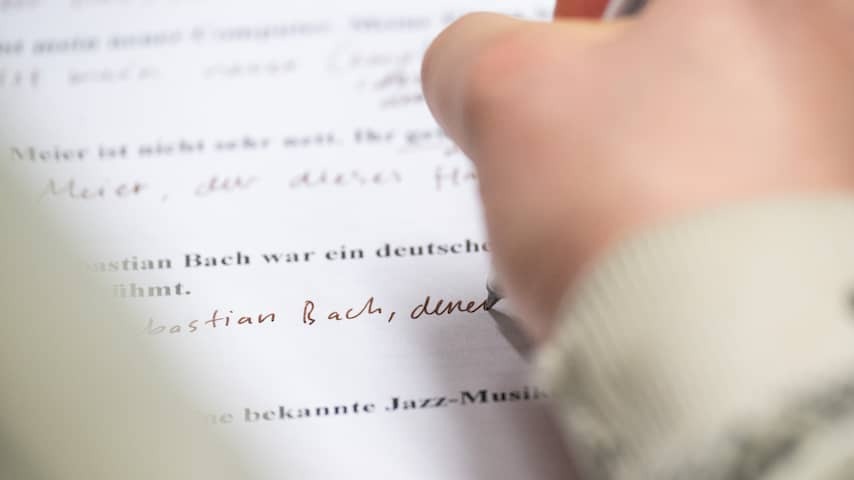
A planned vacation, uncertainty about your English, or wanting to try something new: there are many reasons why you might want to learn a (new) language. But how do you approach that? “You don’t learn a language from a book.”
You are at the local bakery during your vacation in France and want to order something. Are you going to try it in French? Maybe you’ll just point to the bread or try it in a language you’re used to. Because how do you pronounce it again?
If you want to learn a language, you have to dare to speak it, says Wander Lowie, professor of second language acquisition at the University of Groningen. “Don’t be afraid to make mistakes. You have to be open to it and the most important thing is that you have to seek contact with the language.”
So it’s good to ask the question in French. But it’s not crazy that you find that exciting. As a child, you learn a language very easily. That’s partly because children are not so hesitant to use another language, Lowie explains. Adults have more trouble with that.
Chiel van der Veen also recognizes that reluctance in adults. He is a lecturer at Windesheim University of Applied Sciences and a university senior lecturer at the Vrije Universiteit Amsterdam. “It can be a major stumbling block: I don’t know the pronunciation completely, so I hold back.”
However, as an adult you know better how to approach it if you want to learn a language, says Van der Veen. You can better understand how a language works and can make a plan. “You find out that the baker in France doesn’t understand you and you are confronted with the fact that you have to approach it differently.”
How to learn a (new) language
But how do you learn a new language? Learning a language takes time, Van der Veen emphasizes. In addition, you will learn a language that is related to Dutch, such as German, faster than other languages. A language with a completely different script, such as Chinese, takes much more time.
Everyone learns in a different way, but according to Lowie you have less chance of learning the language well if you start with a grammar book. It is important to get in contact with people who speak the language. “If you study a grammar book from cover to cover, you don’t use the language and you don’t learn it either,” Lowie emphasizes. “Try to communicate and keep a dictionary handy.”
‘The grammar follows automatically’
According to Van der Veen, it is also important to immerse yourself in the language. You can best do that in the country where the language is spoken. But it also helps to watch movies, listen to podcasts and radio, or read books.
“You can start with picture books for children,” says Van der Veen. “That is a nice way to quickly make a connection between images and the language.” You can also opt for children’s programs, because they are easier to understand. “Very simple language without complicated constructions has been chosen there,” says Lowie.
Whether you put the subtitles of the film in Dutch or the original language depends on your level. Lowie: “You can start with Dutch subtitles.” If you know it well, you can set it to the language you want to learn, according to the professor. “This way you link the pronunciation to the words that are there. The subtitles are not always the literal translation,” adds Van der Veen.
By listening, reading and speaking to people, you decipher the language yourself, says Lowie. The grammar then develops automatically. “It often starts with speaking skills,” says Van der Veen. “From there you build other skills. Because you watch films, you also learn how to write words and how they are pronounced. And because you read, you also become familiar with words and you can take the step towards writing.”
A language app is a supplement
An app with which you learn the language, such as Duolingo, can help you get used to the language. “This way you can place the very first sentences,” says Lowie. “But you can’t expect to really learn it with that app.”
Van der Veen also sees an app as a supplement. If you want to learn a language, according to him it is about the combination: engaging in interactions, hearing the language around you and conscious study, such as language lessons or via such an app. You learn from interaction with other language users and the feedback you receive on this. You don’t get that with such an app.
Practice in a safe environment and use AI
Do you want to refresh a language that you could speak before? Then these steps can also help. “You know a lot more than you think if you have ever learned a language,” Lowie knows. “Using the language is the only way to refresh it.”
If you are afraid of making mistakes, Van der Veen advises practicing in a safe environment. “For example, have conversations with someone in your area who speaks the language well before you go on vacation.” Or find an AI tool online that pronounces a word for you, he suggests. That way you know how to say something before you walk into the French bakery.
“A lot of difficulties in learning a language come from striving not to make mistakes,” says Lowie. “That is a inhibiting factor. A little flair and not being afraid to make mistakes is a better way than trying to do everything as well as possible.”